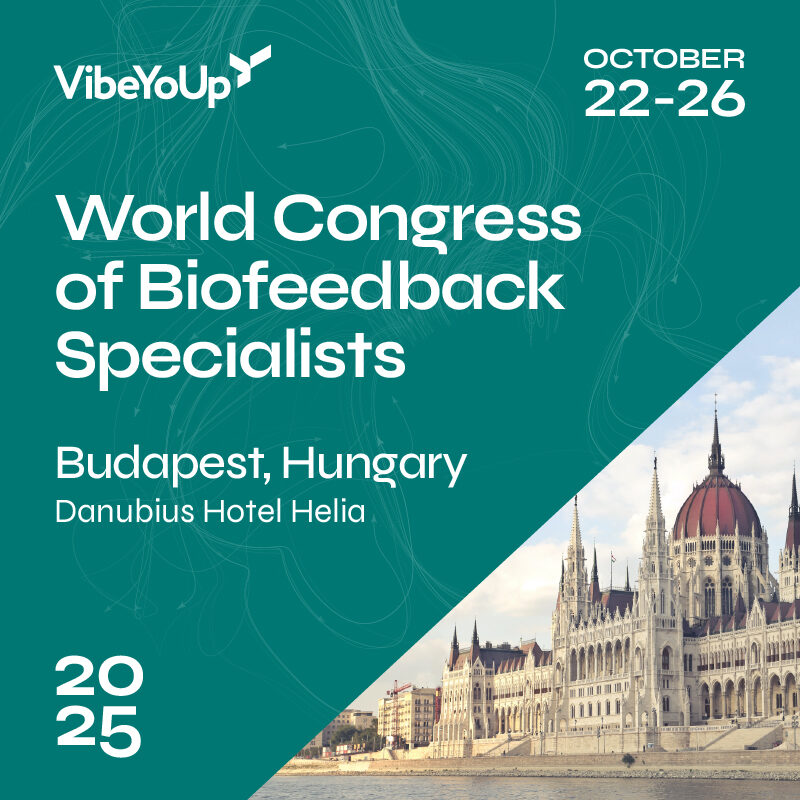Childhood imprints in adulthood – What does biofeedback reveal?
20
25
World Conference
of Biofeedback
Specialists
Budpest, Hungary
Danubius Hotel Helia
october
22-26

📅 October 22–26, 2025 | Danubius Hotel Helia, Budapest
Biofeedback World Conference 2025
Theme: “What do we carry within us?” – The impact of childhood imprints on adult life through the lens of biofeedback
Introduction – When science meets self-awareness
This autumn, the Biofeedback World Conference 2025 will bring the world’s leading biofeedback experts, researchers, and therapists to Budapest.
The central theme of the event explores one of the most fascinating questions in modern psychophysiology:
how childhood experiences shape adult health, decision-making, relationships, and even fertility.
The goal of the conference is to connect scientific research with practical therapeutic approaches offering participants the opportunity to understand that the body and mind are not separate entities but constantly interacting systems.
For five days, attendees can expect lectures, live device demonstrations, interactive workshops, and roundtable discussions — both in person and online, with full replay access.
Childhood experiences: Stories written into the nervous system
Childhood experiences do not merely live in our memories, they form neural patterns that can influence us for a lifetime.
The developing brain is highly sensitive to its environment: every sense of safety, connection, stress, or rejection leaves a mark on synaptic connections, hormonal regulation, and the functioning of the autonomic nervous system.
Chronic tension during early childhood, for example, can lead to persistently elevated stress hormone levels, predisposing adults to anxiety, chronic fatigue, digestive issues, or hormonal imbalance.
Conversely, a secure attachment and emotional support in childhood strengthens the parasympathetic nervous system — the system responsible for rest, regeneration, and balance.
Modern neuroscience confirms it clearly:
The body remembers.
Childhood patterns influence, even at a cellular level, how we respond to stress, how well we rest, connect with others, and even our reproductive health.
Biofeedback: The science of conscious self-regulation
Biofeedback technology offers a revolutionary way to make these invisible patterns measurable and consciously modifiable.
Devices such as the Mandelay Q9 or the SCIO system record physiological processes in real time: heart rate, muscle tension, brainwaves, skin conductance, temperature, and breathing patterns.
These data reveal how the nervous system reacts to various situations — stress, relaxation, focus, or emotional triggers.
The therapist and client can then track, in real time, how the body’s state changes through conscious interventions such as breathing, attention, or relaxation techniques.
This learning process enables a new level of self-regulation.
The client doesn’t heal through external intervention but through training their own nervous system to restore physiological balance.
Scientific studies show that regular biofeedback practice enhances stress resilience, reduces anxiety, improves sleep and concentration, and supports long-term neurological flexibility (neuroplasticity).
Childhood patterns and adult health: The connection to fertility
The 2025 conference dedicates special attention to how childhood experiences influence adult reproductive health.
Research shows that early-life stress, trauma, or neglect can affect the hypothalamic–pituitary–adrenal (HPA) axis — the hormonal system responsible for both stress response and reproductive processes.
When the body remains in a state of constant “alert,” it can disrupt hormone balance, menstrual cycles, libido, and even the likelihood of conception.
Biofeedback therapy, however, can help restore homeostasis — the body’s natural equilibrium.
When the body relearns what safety feels like, the reproductive system also returns to harmony.
One of the conference’s key goals is to demonstrate how biofeedback can help understand and resolve fertility-related challenges, not only biologically, but also psychophysiologically.
Where science meets practice – International experts in Budapest
The Biofeedback World Conference 2025 uniquely brings together leading figures from both the scientific and therapeutic communities.
Featured speakers include:
- Dr. Zita Csomai (Hungary) – medical doctor and naturopath, pioneer of functional health in Hungary;
- Filipa Pinto Cardoso (Portugal) – expert in biofeedback and super-learning modules;
- Benita Serfontein (South Africa) – psychotherapist exploring the link between biography and biology (“Your biography becomes your biology?”);
- Teresa Cumbers (United Kingdom) – geneticist and epigenetics expert, presenting “We are not our genes” on rewriting inherited patterns;
- Fredy Vinagre (Portugal) – specialist in childhood neural overload and adult burnout correlations;
- Harina Lodhia (India) – researcher of post-brain-injury rehabilitation using biofeedback-based techniques.
The conference provides a unique meeting point for doctors, therapists, coaches, psychologists, and anyone interested in the scientific and practical understanding of the mind-body connection.
Conclusion – rewriting the past with awareness
Childhood experiences cannot be erased — but they can be transformed and rewritten.
Biofeedback helps us consciously recognize and reshape the patterns our bodies carry, teaching the nervous system new responses and balance.
This process plays a crucial role not only in stress management but also in improving overall quality of life.
The Biofeedback World Conference 2025 offers an exceptional opportunity to learn first-hand about the latest research, technologies, and therapeutic approaches.
An event where science, human stories, and the process of healing converge — all in Budapest, at the heart of the international professional community.